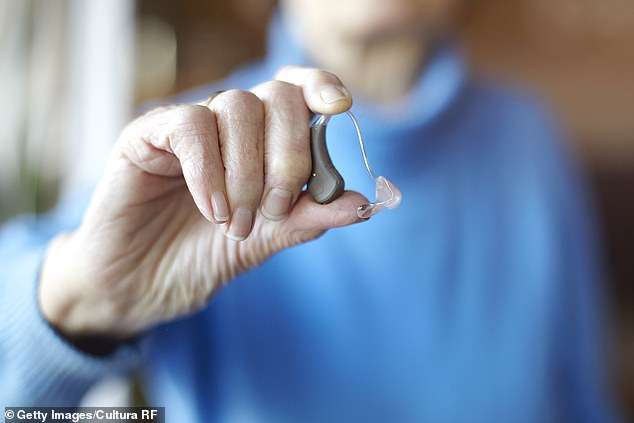







Want to slash the risk of dementia by a third? Sort out your hearing!
We all know someone who shrugs off their hearing loss as just another inevitability of older age. But really, according to the latest research, alarm bells should be ringing.We all know someone who shrugs off their hearing loss as just another inevitability of older age. But really, according to the latest research, alarm bells should be ringing.
Astonishingly, hearing loss in mid-life raises the risk of dementia later on by up to 40 per cent, according to some studies. That makes it the leading preventable cause of dementia, experts say.
The Lancet Commission found that a deterioration in hearing between the ages of 45 and 64 should be treated immediately, and that simply wearing a hearing aid could significantly reduce the risk of developing the devastating condition in the first place.
In fact its findings have revealed that if all hearing loss was promptly treated, nearly one in ten dementia cases could be wiped out.Professor Gill Livingston, who led the Lancet Commission’s review, says: ‘Suddenly we have an enormous opportunity to prevent disease. A lot of research now shows people who correct their hearing loss early have the same risk of dementia as the rest of the population. We once thought that hearing loss was simply an early symptom of dementia. Now we know it may well contribute to its development.
‘We’re starting to see early signs that preventing it, or slowing it down, could be as straightforward as wearing a hearing aid when hearing loss starts.’

Scientists are still trying to work out precisely how hearing loss affects the brain and contributes to dementia. Some argue it is a sign of general ‘neurological frailty’ and that hearing loss could be an early symptom of the disease itself.
But increasing evidence points toward hearing loss coming first and that it directly contributes to the development of dementia.
One reason for the link is that hearing loss makes sufferers more likely to avoid social interaction, which is in itself a risk factor for dementia because it reduces the amount of brain stimulation a person gets. Isolation can, in turn, lead to depression – another known association with the disease, particularly if it affects people in later life.
Conversely, the more social contact an individual has over the age of 50, the less likely they are to develop dementia.
Prof Livingston says: ‘The easiest way to be cognitively stimulated is to be able to hear. It is very challenging to be part of a conversation where you have to respond and notice different people in the group. That really makes a difference to being able to socialise.
One recent study found the worse the hearing loss was, the more likely a person was to suffer poor brain function.
But definitive studies have shown that as soon as a hearing aid is worn, decline is slowed – meaning it is never too late to book that hearing test. Dr Sergi Costafreda Gonzalez, an associate professor in dementia research at University
College London, says: ‘It’s a bit like high blood pressure. 'We now know that even mild problems treated early on significantly reduces risks of heart attacks and stroke. Hearing loss will, I think, will undoubtedly one day be seen as the same – tackling even a small loss of hearing early on will give benefit in terms of reducing the risk of dementia.’

Hearing problems, which affect about 12 million people in the UK, occur as we age due to wear-and-tear damage to the sensory cells inside the ear. This gradually affects our ability to pass sound signals to the brain.
And it starts earlier than you might expect. At least ten per cent of people aged 40 to 69 will already have noticed their hearing isn’t what it once was. In the over 65s, nearly a third have a significant, measurable loss.
One US study found that among those who had poorer hearing in mid-life, when their brains were scanned nearly 20 years later they had greater shrinkage in the right temporal lobe – the area of the brain responsible for interpreting sounds and language, as well as being involved in learning and memory. Why the brain shrinks, however, remains unknown.
A team led by Dr Piers Dawes, a lecturer in audiology at the University of Manchester, is investigating this using data from the brain scans of about 100,000 people. Dr Dawes believes it could be due to the additional effort of listening and concentrating.
He says: ‘Because your brain is working harder to follow a conversation, it has fewer resources left over to help you fully understand the situation, or to store it as a memory.
‘This in turn could reduce brain volume in areas which aren’t being used as much.’
Studies have also linked hearing loss to smoking and cardiovascular problems, which are both risk factors for dementia. a close up of a person: Scientists are still trying to work out precisely how hearing loss affects the brain and contributes to dementia. Some argue it is a sign of general ¿neurological frailty¿ (file photo)Smoking damages blood vessels all over the body – including those in the inner ear. ‘The more you smoke, the worse your hearing,’
Dr Dawes says. ‘If you can give up, it will preserve what remains of your hearing and it seems there is some recovery too.’ Scientists are pushing for more evidence to prove that hearing aids protect against dementia, so that policymakers can take more urgent steps to actively promote their use.
But just advertising the link between hearing loss and dementia may be enough to persuade people to use them. The charity Action On Hearing Loss estimates that the number of people with some degree of deafness will exceed 14.5 million in the UK by 2031 – equivalent to 20 per cent of the population – as the proportion of older people increases and the effects of workplace noise and the widespread use of loud headphones become apparent.
This means that, by definition, this will contribute towards the increase in dementia cases. At present just 40 per cent of those who could benefit from an aid actually use one.
Hearing aids are free on the NHS (buying them privately costs between £1,500 and £2,800), and tests to assess hearing are often free, not just following a referral by a GP, but at many high street retailers such as Specsavers and Boots.
But without having a test, many people won’t realise that they even have a problem – as we naturally become accustomed to our level of hearing, even if it is poor, according to studies.
The message now is simple:
Don’t just turn up the volume on the television, get your hearing checked out and, if it turns out that you need a hearing aid, use it.
Did deafness worsen dad's dementia?Joanna Zara, 58, has often wondered whether her father’s deafness made his memory problems worse.
‘My dad was in his 60s when he started losing his hearing,’ said the milliner, from Hove, East Sussex. ‘It started out as mildly irritating, but family gatherings and conversations became difficult.’
It wasn’t until her dad, John, a retired bank manager was in his 80s that Joanna persuaded him to get a hearing test at Specsavers in Guildford, which revealed he needed aids in both ears. Despite this, it took years for him to get hearing aids and the devices remained stubbornly on his bedside table.
John – who was by then showing early symptoms of dementia – grumbled they were ‘worse than useless’. Intrigued by the link between dementia and hearing loss, Joanna was tested in her early 50s and discovered she had mild hearing loss. She does not need a hearing aid but goes for regular checks. ‘It worries me,’ says Joanna, whose father died in 2016 aged 93.
But if the times comes that she needs treatment, she says she won’t hesitate, as it’s now proven to reduce dementia risk. ‘My hearing loss is marginal, but if I was told I’d benefit from an aid, there’s nothing to lose and so much to gain.’
Mail on Sunday Reporter 15 hrs ago: 2nd August 2020
No thoughts on “Want to slash the risk of dementia by a third? Sort out your hearing!”
Articles - Most Read
- African Holistics - Seduced by Ignorance and Research
- Want to slash the risk of dementia by a third? Sort out your hearing!
- Steroids are life-saving for critically ill COVID-19 patients, WHO says
- Mark Hoppus has stage 4 lymphoma
- 45-year-old woman damages liver from drinking herbal brew - dangerous 'side effects' Story by Solen Le Net •
- Women's Sex Organ Related Dis-eases ( Herpes, V.D., Etc.)
- The health problem plaguing female Olympians as 'pee flies through air' during competition
- Four types of freshwater fish 'globally' associated with rhabdomyolysis - study warning
- Do Yams Have Carbohydrates?
Who's On Line?
We have 202 guests and no members online
Ad Agency Remote
Articles - Latest
- Do Yams Have Carbohydrates?
- 45-year-old woman damages liver from drinking herbal brew - dangerous 'side effects' Story by Solen Le Net •
- Four types of freshwater fish 'globally' associated with rhabdomyolysis - study warning
- The health problem plaguing female Olympians as 'pee flies through air' during competition
- Women's Sex Organ Related Dis-eases ( Herpes, V.D., Etc.)
- Mark Hoppus has stage 4 lymphoma
- Steroids are life-saving for critically ill COVID-19 patients, WHO says
- Want to slash the risk of dementia by a third? Sort out your hearing!
- African Holistics - Seduced by Ignorance and Research
